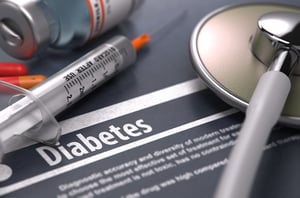Time to read: 8 minutes
 Did you know there is a link between diabetes and hearing loss?
Did you know there is a link between diabetes and hearing loss?
About 1.2 million Australians have diabetes and the chances of being diagnosed with diabetes increases with age. Rates among those aged 65–74 more than 3 times as high as for those aged 45–54 (15.5% and 4.5%, respectively).
Hearing loss also increases with age. The prevalence of hearing loss was estimated to be 3.6 million people in Australia in 2017. Half of men aged between 50 and 59 years had hearing loss. That number jumps to more than 90% for those over 60.
Of especial concern, there is a body of research that identifies the risk of hearing loss actually increases when you have diabetes.
- In a 2008 study conducted by the National Institutes of Health (NIH), diabetic participants were found to be more than twice as likely to have mild to moderate hearing loss than those without the disease. The occurrence of high-frequency hearing loss was more prevalent in diabetics (54%) than in non-diabetics (32%).
- An additional study published in the Journal of Clinical Endocrinology & Metabolism in 2012 supported NIH’s previous findings. This study analyzed results from 13 studies involving more than 20,000 participants. The study concluded that diabetics were more likely to have hearing loss than those without the disease, regardless of their age.
What is diabetes?
There are three types of diabetes:
- Those diagnosed with Type 1 diabetes are unable to produce the insulin required to move glucose into cells due to an autoimmune situation in which the body attacks the beta cells which produce the hormone.
- Those diagnosed with Type 2 diabetes are able to produce their own insulin; however, the quantity may not be sufficient or effective enough to move glucose into the cells.
- Some pregnant women develop gestational diabetes, a condition in which hormones make the body’s cells more resistant to insulin. Gestational diabetes typically disappears once the baby is delivered.
What does diabetes have to do with hearing loss?
The mechanism is still under investigation but it appears that elevated blood sugar levels can damage the tiny blood cells in the inner ear. This disrupts sound reception and makes it harder to hear.
What you can do
 Hearing Health
Hearing Health
If you are diagnosed with diabetes, you should have an annual hearing check. This should be part and parcel of your annual health maintenance checks
Start with a 15 minute screening test which will quickly identify whether or not you have a hearing loss which will be used to benchmark your results over time.
If you do have hearing loss, your clinician will recommend that you take a comprehensive screening test. This will take about two hours. At Value Hearing, both the screening and the hearing tests are free of charge.
Not every company does testing the same. We have an article that goes into detail about Value Hearing’s process designed to get the very best results in a variety of real-life circumstances.
It is absolutely vital to care for your hearing health. Untreated poor hearing has been linked to social isolation, depression and dementia.
Managing Diabetes
 Your doctor will set up a management plan for you that addresses diet and exercise and tailor it to your needs.
Your doctor will set up a management plan for you that addresses diet and exercise and tailor it to your needs.
Mind your portion sizes, especially when it comes to carbohydrates.
Variety is the spice of life, so make sure you plate is balances with lean proteins and vegetables. Enjoy fruits and whole grain foods as your doctors advise.
Also balance your meals and medications to prevent blood sugar fluctuations.
Enjoy plenty of exercise. Your body uses sugar for energy. All types of exercise is beneficial but more strenuous workouts provide longer lasting results.
You should be aiming for at least two and half hours each week.
And, most importantly, monitor your blood sugar level regularly.